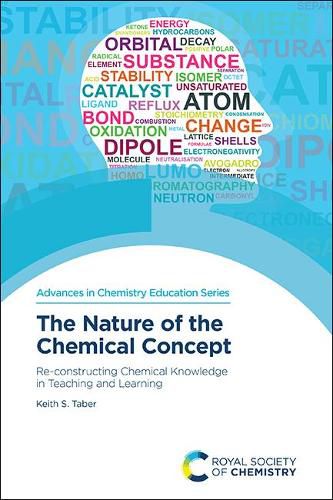Readings Newsletter
Become a Readings Member to make your shopping experience even easier.
Sign in or sign up for free!
You’re not far away from qualifying for FREE standard shipping within Australia
You’ve qualified for FREE standard shipping within Australia
The cart is loading…






The features of chemistry that make it such a fascinating and engaging subject to teach also contribute to it being a challenging subject for many learners. Chemistry draws upon a wide range of abstract concepts, which are embedded in a large body of theoretical knowledge. As a science, chemistry offers ideas that are the products of scientists’ creative imaginations, and yet which are motivated and constrained by observations of natural phenomena. Chemistry is often discussed and taught largely in terms of non-observable theoretical entities - such as molecules and electrons and orbitals - which probably seem as familiar and real to a chemistry teacher as Bunsen burners: and, yet, comprise a realm as alien and strange to many students as some learners’ own alternative conceptions (‘misconceptions’) may appear to the teacher. All chemistry teachers know that chemistry is a conceptual subject, especially at the upper end of secondary school and at university level, and that some students struggle to understand many chemical ideas. This book offers a step-by-step analysis and discussion of just why some students find chemistry difficult, by examining the nature of chemistry concepts, and how they are communicated and learnt. The book considers the idea of concepts itself; draws upon case studies of how canonical chemical concepts have developed; explores how chemical concepts become represented in curriculum and in classroom teaching; and discusses how conceptual learning and development occurs. This book will be invaluable to anyone interested in teaching and learning and offers guidance to teachers looking to make sense of, and respond to, the challenges of teaching chemistry.
$9.00 standard shipping within Australia
FREE standard shipping within Australia for orders over $100.00
Express & International shipping calculated at checkout
The features of chemistry that make it such a fascinating and engaging subject to teach also contribute to it being a challenging subject for many learners. Chemistry draws upon a wide range of abstract concepts, which are embedded in a large body of theoretical knowledge. As a science, chemistry offers ideas that are the products of scientists’ creative imaginations, and yet which are motivated and constrained by observations of natural phenomena. Chemistry is often discussed and taught largely in terms of non-observable theoretical entities - such as molecules and electrons and orbitals - which probably seem as familiar and real to a chemistry teacher as Bunsen burners: and, yet, comprise a realm as alien and strange to many students as some learners’ own alternative conceptions (‘misconceptions’) may appear to the teacher. All chemistry teachers know that chemistry is a conceptual subject, especially at the upper end of secondary school and at university level, and that some students struggle to understand many chemical ideas. This book offers a step-by-step analysis and discussion of just why some students find chemistry difficult, by examining the nature of chemistry concepts, and how they are communicated and learnt. The book considers the idea of concepts itself; draws upon case studies of how canonical chemical concepts have developed; explores how chemical concepts become represented in curriculum and in classroom teaching; and discusses how conceptual learning and development occurs. This book will be invaluable to anyone interested in teaching and learning and offers guidance to teachers looking to make sense of, and respond to, the challenges of teaching chemistry.